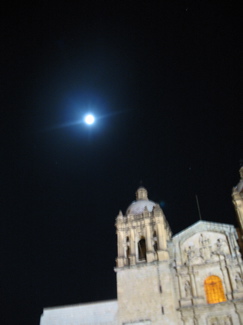I loved reading this novel, indeed I find it compelling. When I try to describe why, however, my words are turning out too large and clumsy to capture the fine brushstrokes with which Bioy paints his narrator’s daily survival tasks, his persistent investigation of his surroundings, the ups and downs of his emotions, and the ambiguously transformative effect of his love for Faustine.
Before he sees the image of Faustine, the narrator recounts his flight to the island as a falsely condemned fugitive. The Italian rugseller who told him about the island described the death of people he said were from a ship that had been at the island, people we later understand are Morel’s guests and victims. At first the narrator views the people (images) as intruders and fears their capacity to turn him in (p. 3; Eng. p 11). As he falls in love with Faustine, however, he overcomes the spatial limitations set by his fear. He persists in exploring what he thinks to be dangerous space in the Museum and pursues his inquiry about the images until eventually he “explains everything” (p. 87; Eng 99).
Early on he described his situation as unbearable/ deplorable” (p.4 Eng. 10). His description of his efforts to remain alive on the island in the first few pages is similarly grim. Gradually his effort to get close to Faustine become the center of the narration. Towards the end of the novel the motif of his life being intolerable resumes (p. 82, 84 Eng. 93, 95), but now it is intolerable to be separated from Faustine. His desire join her culminates in him transforming himself into an image accompanying hers, with the hope that someday someone will find his writings and have the technology to recreate him and her together.
As noted in the introduction, the name Morel alludes to Moreau; Faustine’s name evokes Faust – though no one character in the novel really resembles Faust, certainly not Faustine. I think the name Faustine simply signals that the novel deals with the themes of Goethe’s Faust. It deals with them in a very different way, however, in my opinion.
Subscribe to:
Post Comments (Atom)

Interesting comment about the possible relationship between Faust and Faustine. Perhaps it's the issue of eternal love, which both Morel and Faust share that explains the name.
ReplyDelete